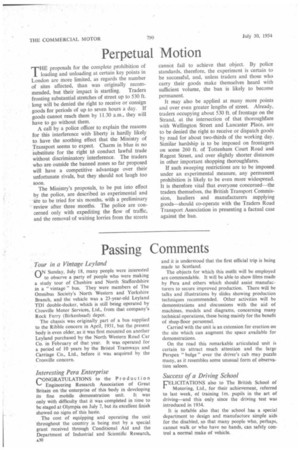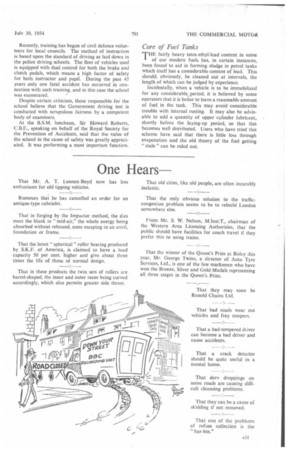Passing Comments
Page 32

Page 33

If you've noticed an error in this article please click here to report it so we can fix it.
Tour in a Vintage Leyland
nN Sunday, July 18, many people were interested
to observe a party of people who were making a study tour of Cheshire and North Staffordshire in a " vintage " bus. They were members of The Omnibus Society's North Western and Yorkshire Branch, and the vehicle was a 23-year-old Leyland TD1 double-decker, which is still being operated by Crosville Motor Services, Ltd., from that company's Rock Ferry (Birkenhead) depot.
The chassis was originally part of a bus supplied to the Ribble concern in April, 1931, but the present body is even older, as it was first mounted on another Leyland purchased by the North Western Road Car Co. in February of that year. It was operated for a period of 10 years by the Bristol Tramways and Carriage Co., Ltd., before it was acquired by the Crosville concern.
Interesting Pera Enterprise
CONGRATULATIONS to the Production
Engineering Research Association of Great Britain on the enterprise of this body in developing its fine mobile demonstration unit. It was only with difficulty that it was completed in time to be staged at Olympia on July 7, but its excellent finish showed no signs of this haste.
The cost of equipping and operating the unit throughout the country is being met by a special grant received through Conditional Aid and the Department of Industrial and Scientific Research,
and it is understood that the first official trip is being made to Scotland.
The objects for which this outfit will be employed are commendable. It will be able to show films made by Pera and others which should assist manufacturers to secure improved production. There will be talks and illustrations by slides showing production techniques recommended. Other activities will be demonstrations and discussions with the aid of machines, models and diagrams, concerning many technical operations, these being mainly for the benefit of shop-floor personnel.
Carried with the unit is an extension for erection on the site which can augment the space available for demonstrations.
On the road this remarkable articulated unit is certain to attract much attention and •the large Perspex " bulge " over the driver's cab may puzzle many, as it resembles some unusual form of observation saloon.
Success of a Driving School
FELICITATIONS also to The British School of Motoring, Ltd., for their achievement, referred to last week, of training 1m. pupils in the art of driving—and this only since the driving test was introduced in 1934.
It is notable also that the school has a special department to design and manufacture simple aids for the disabled, so that many people who, perhaps, cannot walk or who have no hands, can safely control a normal make of vehicle.
Recently, training has begun of civil defence volunteers for local councils. The method of instruction is based upon the standard of driving as laid down in the police driving schools. The fleet of vehicles used is equipped with dual control for both the brake and clutch pedals, which means a high factor of safety for both instructor and pupil. During the past 45 years only one fatal accident has occurred in connection with such training, and in this case the school was exonerated.
Despite certain criticism, those responsible for the school believe that the Government driving test is conducted with scrupulous fairness by a competent body of examiners.
At the B.S.M. luncheon, Sir Howard Roberts, C.B.E., speaking on behalf of the Royal Society for the Prevention of Accidents, said that the value of the school in the cause of safety was greatly appreciated. It was performing a most important function.
Care of Fuel Tanks
THE fairly heavy tetra-ethyl-lead content in some of our modern fuels has, in certain instances, been found to aid in forming sludge in petrol tanks which itself has a considerable content of lead.. This should, obviously, be cleaned out at intervals, the length of which can be judged by experience.
Incidentally, when a vehicle is to be immobilized for any considerable. period, it is believed by some operators that it is better to leave a reasonable amount of fuel in the tank. This may avoid considerable trouble with internal rusting. It may also be advisable to add a quantity of upper cylinder lubricant, shortly before the laying-up period, so that this becomes well distributed. Users who have tried this scheme have said that there is little loss through evaporation and the old theory of the fuel getting " stale " can be ruled out.




















































































